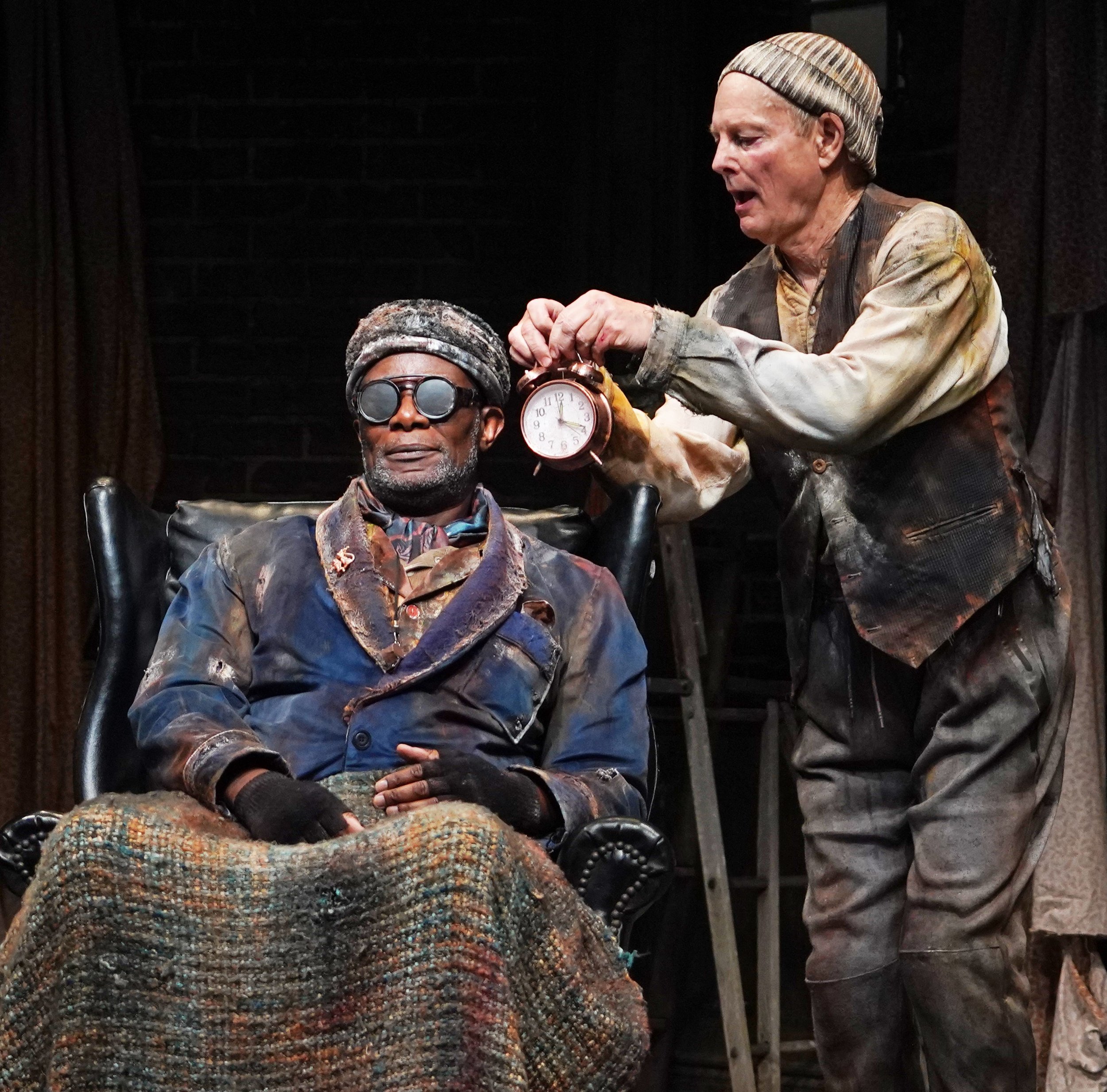John Douglas Thompson, left, as Hamm, and Bill Irwin as his servant Clov, in Samuel Beckett’s Endgame.
John Douglas Thompson and Bill Irwin starring in Samuel Beckett’s tragicomic masterpiece Endgame: it’s hard to imagine a more appealing combination. Thompson is perhaps the greatest classical actor of his generation, and Irwin one of the world’s premier interpreters of Beckett, as anyone who witnessed his master class On Beckett (which, like Endgame, played at the Irish Repertory Theatre) can attest. The production, anchored in two brilliant performances and under Ciarán O’Reilly’s precise and elegantly understated direction, exceeds even lofty expectations, perfectly capturing the play’s absurd, macabre comedy without sacrificing its haunting bleakness.
Hamm’s trash-bin-residing parents, Nell (Patrice Johnson Chevannes, left) and Nagg (Joe Grifasi).
Endgame takes place in a bare, dirty room, with two trash cans; there are brick walls with two small windows that require a ladder to access. Hamm (Thompson) is confined to a makeshift wheelchair, and at first a bloody handkerchief covers his face, which is removed to reveal dark glasses over his sightless eyes. Hamm’s servant, Clov (Irwin), whose labored domestic tasks open the play, hobbles painfully through the door any time Hamm blows the whistle that dangles around his neck. Charlie Corcoran’s scenic design is perfectly drab and worn-out—the empty wooden picture frame hanging on the wall is a fine touch. Orla Long’s costumes honor the details provided in Beckett’s stage directions while emphasizing filth.
Hamm’s blindness and his bleeding, like Clov’s debilitating injuries, are signs of the general degradation of the post-apocalyptic world around them, or at least what is visible to Clov through the small windows.
Clov: Have you bled?
Hamm: Less. (Pause) Is it not time for my pain-killer?
Clov: No. (Pause)
Hamm: How are your eyes?
Clov: Bad.
Hamm: How are your legs?
Clov: Bad.
Hamm: But you can move.
Clov: Yes.
Hamm: (Violently) Then move!
“Something is taking its course” is Clov’s refrain. Hamm’s is “Me to play,” which resonates with the chess imagery of the title, as well as the highly theatrical nature of the play. Hamm is composing a story within the play, one that he sadistically relishes in telling, and later he instructs Clov on what an “aside” is and announces, “I’m warming up for my last soliloquy.” The master-servant dynamic draws on Shakespeare’s The Tempest, with Hamm quoting Prospero’s “Our revels now are ended,” and Clov conjuring up the image of Prospero’s slave Caliban.
The blind Hamm inspects the room as Clov wheels him around. Photographs by Carol Rosegg.
The immobile, tyrannical Hamm is all about voice: he is at turns imperious, helpless, oratorical, sly, impish, or vicious, and there’s simply no one better with language and tone than Thompson, who moves among these registers with an uncanny deftness. Portraying his servant, Clov, broken in body and spirit, requires the contorted, clownish physicality that is Irwin’s trademark: Irwin’s Clov climbing a ladder and hoisting one of his legs over the top rung is a work of art in itself. Beckett’s linguistic repetitions, contradictions, and gnomic pronouncements take on a musical quality in the banter between Thompson’s Hamm and Irwin’s Clov—it’s easy to believe these are scenes and verbal games they have played out countless times. “What time is it?” Hamm asks; “The same as usual,” Clov responds.
“‘Nothing is funnier than unhappiness.’”
Beckett’s hellscape becomes more pronounced after Hamm’s parents appear, seen only from the neck up, in the two trash bins where they live, legless and half starved. Nagg (Joe Grifasi), though, is surprisingly good-natured, despite Hamm referring to him by various epithets, including “Accursed progenitor,” and otherwise tormenting him. He’s mischievous, too, in a childlike way, sneakily rolling his eyes or glowering at Hamm, especially when he’s denied a sugarplum. He’s fond of attempting to reminisce with his wife, Nell (Patrice Johnson Chevannes), who utters one of the most apt lines of the play, “Nothing is funnier than unhappiness.” Grifasi and Chevannes, both excellent, have terrific chemistry in their scene together, which manages to be genuinely sweet, if pitiable. Chevannes’s melodramatic, nostalgic rendition of the word “yesterday” elicited some of the biggest laughs of the play.
From the beautiful opening lights up, where Clov is slowly illuminated in a sea of blackness (lighting design by Michael Gottlieb), onward, everything in this production excels. O’Reilly’s direction achieves what feels like exactly the right balance between tragic and comic elements. And it is simply thrilling to watch Thompson and Irwin do battle as Hamm and Clov. Thompson’s delivery of Hamm’s final soliloquy will leave you breathless, and yet somehow smiling in the face of oblivion.
Samuel Beckett’s Endgame runs through March 12 at the Irish Repertory Theatre (132 W. 22nd St.). Evening performances are at 7 p.m. Wednesday, Thursday, and Saturday and at 8 p.m. Friday; matinees are at 2 p.m. Wednesday and Saturday and at 3 p.m. Sunday. Masks are required at Wednesday matinees and on Saturday evenings. Tickets are available by calling the box office at (212) 727-2737 or visiting irishrep.org.





